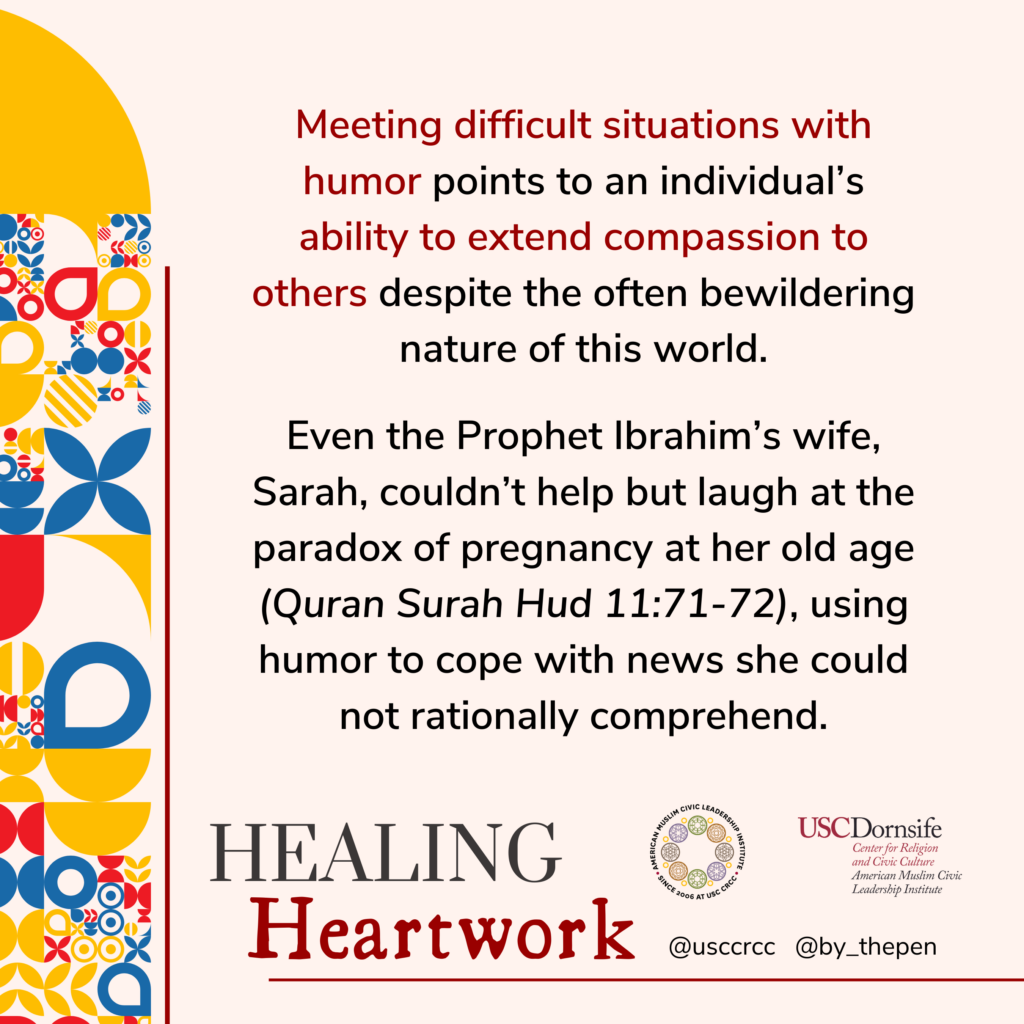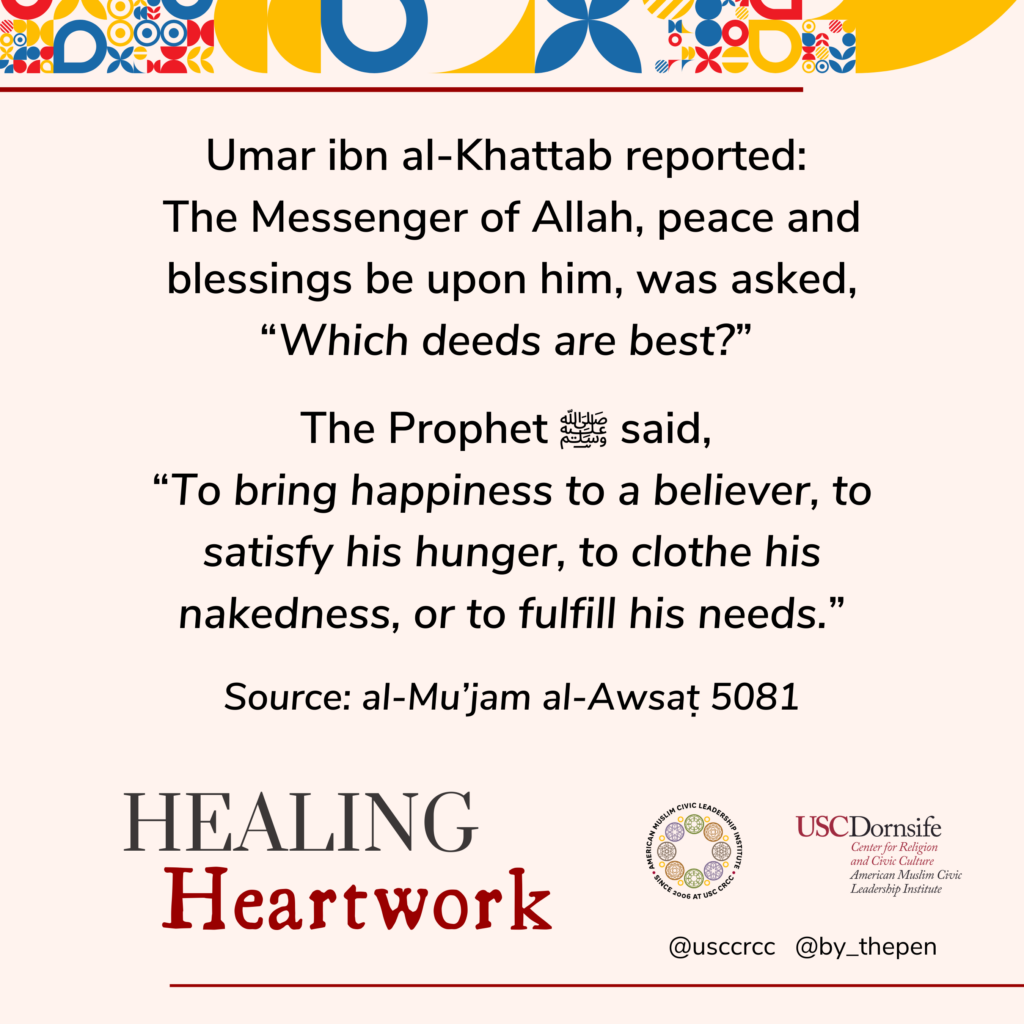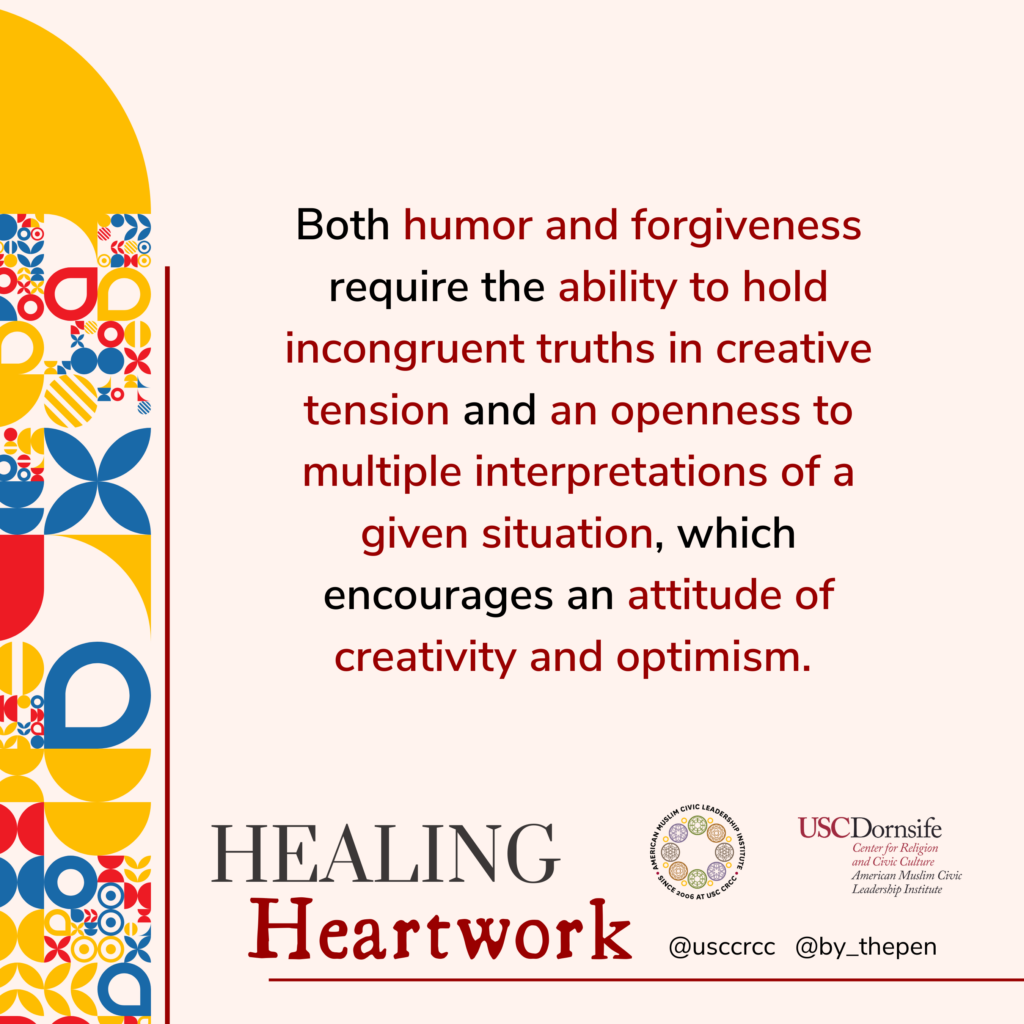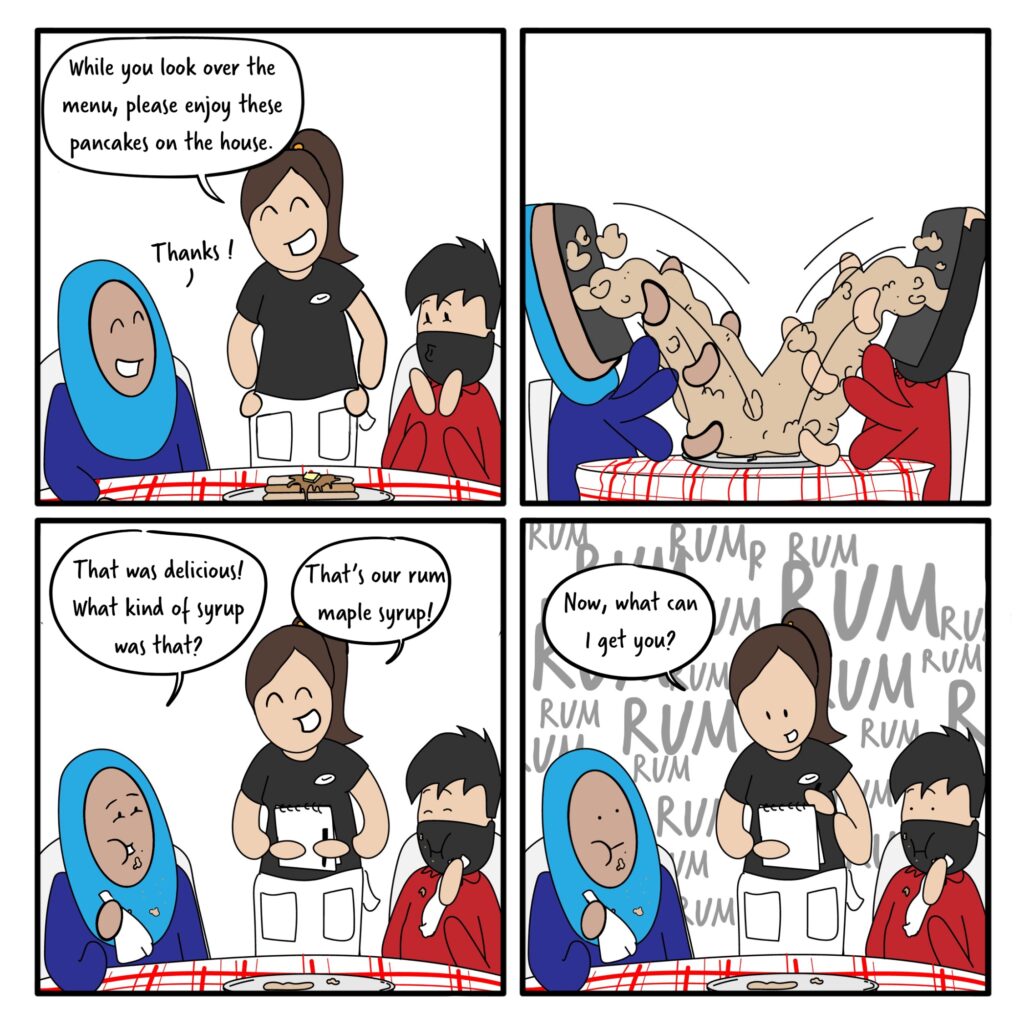A philosopher, having made an appointment to dispute with Mulla Nasrudin, dropped by and found him away from home. Infuriated, the philosopher picked up a piece of chalk and wrote “Stupid Oaf” on Nasrudin’s gate. As soon as he got home and saw this, Nasrudin rushed to the philosopher’s house. “I had forgotten,” Nasrudin said, “that you were to call. And I apologize for not having been at home. Of course, I remembered the appointment as soon as I saw that you had left your name on my door.”
– adapted excerpt from “The Exploits of the Incomparable Nasrudin”
There is considerable research that confirms the relationship between managing stress and one’s ability to take a humorous and positive perspective on challenging situations. In the vignette above, Nasrudin, the “wise fool” character in Muslim literature, opts to view the philosopher’s intended insult in a different light, one that allows Nasrudin to extend forgiveness toward the philosopher, continue a relationship with him, and even gain the moral upper hand. One study demonstrates a specific correlation between humor and forgiveness, positing that those who possess a sense of humor take a lighter perspective on difficult people and situations and tend to forgive more easily. Similarly, individuals who perceive themselves as happy also usually describe themselves as more forgiving. The converse also holds true – those who easily forgive report a higher level of happiness and inner peace.
Meeting difficult situations with humor points to an individual’s ability to extend compassion to others despite the often bewildering nature of this world. Even the Prophet Ibrahim’s wife, Sarah, couldn’t help but laugh at the paradox of pregnancy at her old age (Quran 11:71-72), using humor to cope with news she could not rationally comprehend.

Applying humor when confronted with the heaviness of this world is best modeled in the example of the Prophet Muhammad ﷺ, who often used levity to facilitate his teaching.
One prophetic teaching states that the best of deeds includes, among other charitable actions, bringing happiness to a believer (al-Mu’jam al-Awsaṭ 5081) and, in another narration, that whoever relieves a Muslim of the burdens of the world, Allah will relieve him of a burden on the Day of Judgement (Jami` at-Tirmidhi 1930).
More explicitly, the Prophet taught that smiling at others can be understood as a form of charity (Jami` at-Tirmidhi 1956). When the Prophet ﷺ would speak, he would often smile, communicating approachability, care, and warmth.

Umar ibn al-Khattab reported: The Messenger of Allah, peace and blessings be upon him, was asked, “Which deeds are best?” The Prophet ﷺ said, “To bring happiness to a believer, to satisfy his hunger, to clothe his nakedness, or to fulfill his needs.”
Source: al-Mu’jam al-Awsaṭ 5081
Humor and Lightness of Being
The Prophet ﷺ and his companions frequently engaged one another in a light-hearted manner to encourage this forgiving approach to human interaction. The companion Mahmud bin Rabi relayed one such example of the Prophet ﷺ’s levity, sharing that, “When I was five years of age, the Prophet ﷺ came to our house, drank water from the well and, in a playful manner, squirted water with his mouth in my direction” (Sahih al-Bukhari, Kitab-ul-Ilm). Another companion named Nouyman ibn Amr carried a reputation for practical jokes. Once, Nouyman took an item from a traveling caravan to Medina without paying for it and gifted it to the Prophet Muhammad. When the merchant caught Nouyman and insisted on payment, Nouyman took the merchant to the Prophet ﷺ and said, “Oh Prophet of Allah! Pay him the price of that item.” The Prophet ﷺ, surprised, asked, “Did you not gift it to me?” Nouyman replied, “I had no money with me, but I really wanted you to have the item.” The Prophet ﷺ laughed and paid for the item.
Even in the midst of battle, the Prophet ﷺ and his companions used moments of levity to restore balance. The companion ‘Auf bin Malik shared a memory during the Battle of Tabuk when he visited the Prophet ﷺ, who was resting in a very small tent. After being invited inside, ‘Auf joked about the size of the tent by asking the Prophet ﷺ, “Should I bring my whole body in?” The Prophet ﷺ enjoyed the joke and, returning the banter, replied, “Yes, bring your whole body in the tent” (Sunan Abu Daud, Kitab-ul-Adab).
Comic Relief
A number of stories from the hadith literature capture the Prophet Muhammad ﷺ’s endearing sense of humor, which he particularly used to bring relief to those who were suffering. An elderly woman approached the Prophet ﷺ and, concerned about her salvation in her old age, pleaded with him to ask God to accept her into Heaven. The Prophet ﷺ replied to her teasingly that no old woman will enter Heaven, which prompted the elderly woman to burst into tears. The Prophet ﷺ then quoted a verse from the Qur’an that implied that women will return to their youthful bodies in Heaven, reassuring the elderly woman that she will not only enter into Heaven but also in her best form (Ash-Shama’il Al-Muhammadiyah 239).
In another story, a man came to the Prophet Muhammad ﷺ visibly awe-struck. To put him at ease, the Prophet used self-effacing humor, saying, “I am just a man whose mother ate dried meat.” And when meeting with a sorrowful youth whose bird just died, the Prophet ﷺ comforted him with a playful pun, rhyming the boy’s nickname “Abu Umayr” with the word for sparrow, “al-nughayr” (Sunan Abī Dāwūd 4969).
Creating Ease with Laughter
The Prophet Muhammad ﷺ also deployed humor in situations when those from his community behaved in less-than-optimal ways, meeting them with forgiveness rather than reproach. A man once approached the Prophet ﷺ in remorseful distress, confessing that he was intimate with his wife during the fasting hours of Ramadan. The Prophet ﷺ recommended several expiating actions, and the man declined each one. The Prophet ﷺ fell silent for a moment and, spotting a basket of dates, handed one to the man and recommended that the man give it away as an act of charity for expiation. The man then proclaimed that he should have the date himself as he was poorer than most. The Prophet Muhammad ﷺ responded to the man’s obstinance with humor and, grinning widely, told the man just to take the date to his family (al-Bukhaari, Fath, 1936).
We learn, from the Prophet Muhammad ﷺ’s example, that levity, when tempered with wisdom and balance, may help bring ease to others and to ourselves. Both humor and forgiveness require the ability to hold incongruent truths in creative tension and an openness to multiple interpretations of a given situation, which encourages an attitude of creativity and optimism.

Learning Activities: Comedic Relief

Chaplain Sondos Kholaki is an AMCLI fellow and guest contributor with the USC Center for Religion and Civic Culture.


